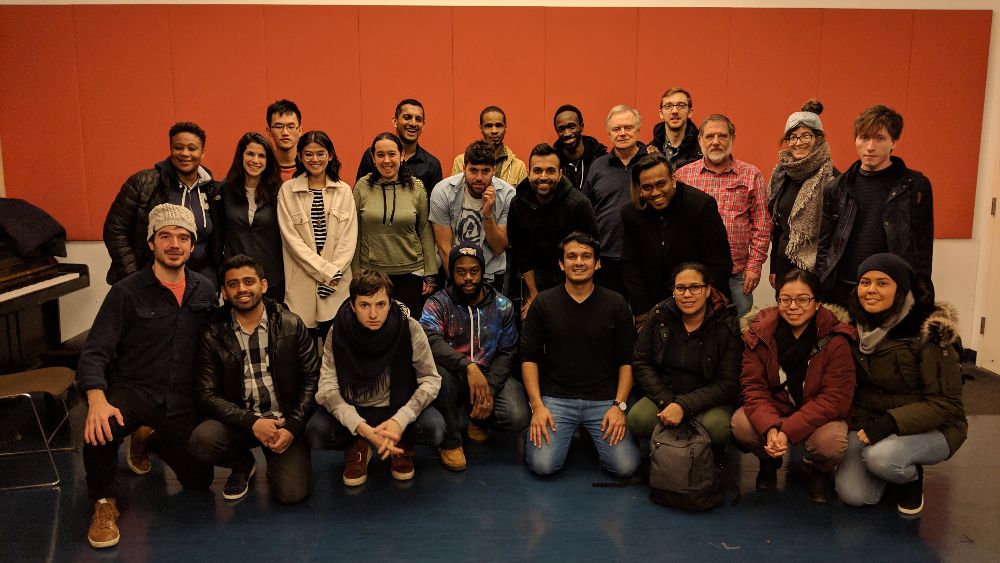
by Stavros Ladeas | Mar 7, 2019 | Recaps
We were back at our usual venue for our February meeting. About 30 of us came out, including a few brave first-timers and some SLP students who were there to see what it is that we do at these meetings. We started off with our intros, which are of course optional, and then split into three smaller groups. Below are a few topics that were discussed during the meeting. Also, a special thank you to Chani for helping co-facilitate one of the groups.
One of the groups started with a question from a first timer to the group about whether people have found that their stuttering has changed as they have gotten older. Many members expressed that their feelings about their stuttering had more to do with where they were on their stuttering journey than a specific age or decade of their lives. Some members shared that stuttering was more challenging for them as children growing up because often their teachers in school did not understand stuttering and would often call on them to read aloud or present in front of the class. Another difficult time period for being a PWS that was expressed was adolescence because of the social pressures to fit in. It can be challenging to handle stuttering at any stage of life, but as many members shared, our stuttering journeys are unique in that it doesn’t matter how old you are, you can change the way that you think and feel about your stuttering and not let it hold you back.
One topic that we discussed in one of the groups was advertising when applying or interviewing for jobs/school. One member shared that he was applying for graduate school and was contemplating disclosing stuttering on the application. Many people in the group agreed that this was a personal decision and that advertising most of the time is for yourself and not for the listener. By advertising, most of us do not magically become more fluent. For many of us, it is a significant mindset shift since it actively goes against years and years of conditioned shame and trauma. From there, we delved deeper into this trauma, and how so many of us believe that stuttering has and often still holds us back from our true potential – especially in a society in which we are often commoditized. We agreed that we need to find ways to grieve this shame and idea of fluency in order to move forward, and it is groups like this where we can allow ourselves the space to learn how to do so.
In another group, the topic came up with introducing ourselves at work, specifically when a new hire shows up at the office. One member expressed how he likes to make people feel welcome and comfortable and values introductions, but sometimes puts them off. The group expressed how it is important to keep a few things in mind when processing this sort of behavior. Being too hard on yourself, like if you do not always go up to someone to introduce yourself and then feel bad about it, probably will not be a super helpful feeling to carry around with you. It is also important to try to distinguish what your current behavior actually is. Are you not going up to introduce yourself during the first day of each new hire, or do you actually avoid all introductions at all costs – or are you somewhere in the middle? The point is, sometimes we focus on just the one side of things, many time the negatives, and we do not give enough credit to ourselves when it is due. tl;dr: Love yourself and screw introductions.
See you all soon!
Stavro and Manhattan Chapter Co-Leaders
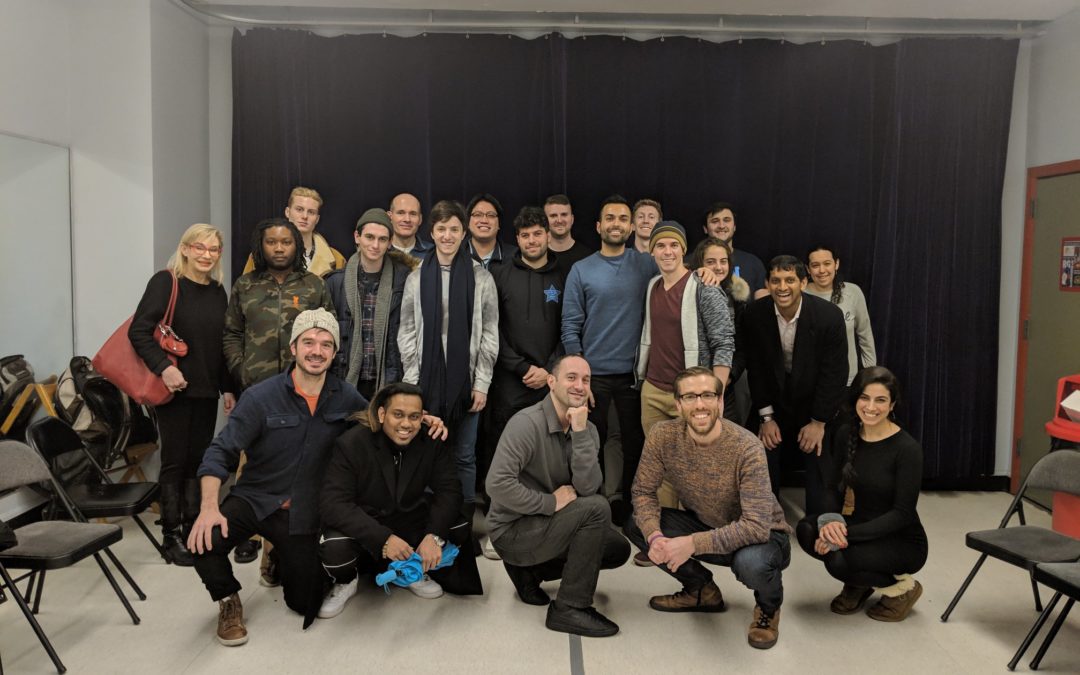
by Stavros Ladeas | Feb 14, 2019 | Recaps
Here is a recap of our January meeting for those of you who weren’t around. We’re also meeting this upcoming Monday (President’s Day) for our February meeting (details below).
Per usual, we split into three groups. One group discussed the familiar plethora of emotions stuttering can bring while it’s happens. Some of these emotions run very deep, and may be riddled with shame or disappointment from our past. But perhaps they don’t have to impact us so much today. One member who had given a presentation in front of 100 people wanted to avoid a replay of a previous situation where she was laughed at when she stuttered. In that situation she genuinely believed the laughter wasn’t malicious, but a confused response from her audience. Would it be different this time if she disclosed? Several group members weighed in on their thoughts and shared their experiences of disclosing, which usually turned out to be very good.
One of the groups discussed how physically exhausting blocks can be, both during and after the block. We also talked about all the negative feelings we have about all this, and what we can do to manage these feelings. This led to a conversation about control, an interesting topic, that in one way or another, often makes its way into these meetings. But how useful is control when talking about our stuttering? One member expressed for him, playing with his stuttering, with people he felt very comfortable with, and making it more intense, to know what it feels like to have control, can psychologically be one way to regain a bit of control when it comes to the level of his fluency, or the severity of a block.
In another group, one topic that came up was social media and how stuttering is often portrayed in certain platforms. One member expressed how the way stuttering is portrayed on Twitter, often in a ridiculing manner, may be indicative of how society still views stuttering. But is this so? One member felt that this was just selection bias, and this cannot be an accurate representation of what the general public feels. For instance, it is unclear what the demographic is of people who make fun of stuttering online, and almost certainly many of these people are ignorant buffoons. Also, the other 95% (just made this number up) of people who are respectful while interacting with a person who stutters, most likely don’t go on social media and boast how amazing they were for not laughing at someone’s face. It was an interesting discussion.
February Meeting Reminder
Come join us this coming Monday on February 18th for our NSA Manhattan meeting! Can’t wait to see you there.
• DATE: Monday, February 18
• TIME: 7:30–9pm
• LOCATION: 520 Eighth Avenue, between 36th and 37th Streets – 3rd Floor
Please arrive a little early is possible. There may be a short line to get past security. At the security desk, say you are going to A.R.T./New York on the 3rd floor. (This is the Alliance of Resident Theatres.) For security purposes, you will need to present a photo ID and have your picture taken. Take the left side elevators to get to the 3rd floor.

by NSA Manhattan | Dec 22, 2018 | Recaps
We met on our regular 3rd Monday of the month on December 17th. Around 25 people who stutter showed up and as per usual, we split up into 3 groups for more intimate discussions.
In one of the groups, the topic of confidence and how it pertains to our stuttering came up. We discussed how many of us who stutter are generally sensitive people. For some of us, this sensitivity includes how we are perceived while speaking. A few members expressed that when speaking on a topic they are passionate about, they feel more reassured and confident than usual and as a result, seemingly care less about disfluencies. But on the other hand, one member shared that as people who stutter, we may face extra scrutiny because in a fluent world, someone who has disfluencies may mistakenly appear nervous, incompetent, or even untrustworthy to listeners.
Another group started the night by talking about avoidances and advertising. Members shared that often they are tempted to avoid their stuttering at work or during social situations, and this pull towards avoidance can many times feel overwhelming and all-encompassing. One member shared his recent experience of self-advertising at work. After many years of being covert about his stuttering, self-advertising and “coming out’ as a person who stutters at work felt liberating. Collectively, we explored how taking small steps to be more open about stuttering-whether 1:1, in a small or large-group setting-can enable us to get a little closer to stuttering acceptance.
In the last group, we began with a particularly vulnerable discussion of mental health and stuttering. Often times, these groups can be a beacon of positivity and light around stuttering, but it is always a meaningful reminder that this is our space and we can fill it with whatever we need to release for the hour or so we share together. We then went on to talk about the internalization of stuttering and growing up with this looming belief of body failure and misrepresentation. Different members shared different manifestations of this internalization. It can be the hesitation or regret when sharing ideas in a group, or it can be the over-analyzation of a simple interaction or feeing.
As 9 o’clock neared, we re-grouped as whole, read our closing words, and ended the night on a high. As per tradition, a few of us headed to the local bar after and had a drink or two and continued socializing on a lighter note.
We want to thank everyone for all the energy they have contributed to growing and deepening our abundant stuttering community this year. It is this energy that we are all so grateful for and brings us back together every month. So, thank you for acknowledging each and every single one of our stuttering journeys and your own. We are wishing you the happiest of all holidays and can’t wait to reconnect in 2019.
Upcoming Events in the New Year – 2019!
- Improv Seminar with our very own Marc Winski – Sunday, January 20th
- This event will be at our regular meeting space at 520 Eighth Avenue from 2-4pm.
- More details to come!
- SMBC Mock Interview Event hosted by our very own Kunal Muhajan – Thursday, January 31
- This is an incredible networking opportunity for people who stutter to give and receive interviewing feedback.
- Here is the link with more information, as well as online registration for the upcoming event!
- For more information regarding this event, contact: Kunal Mahajan at kunal_mahajan@smbcgroup.com.
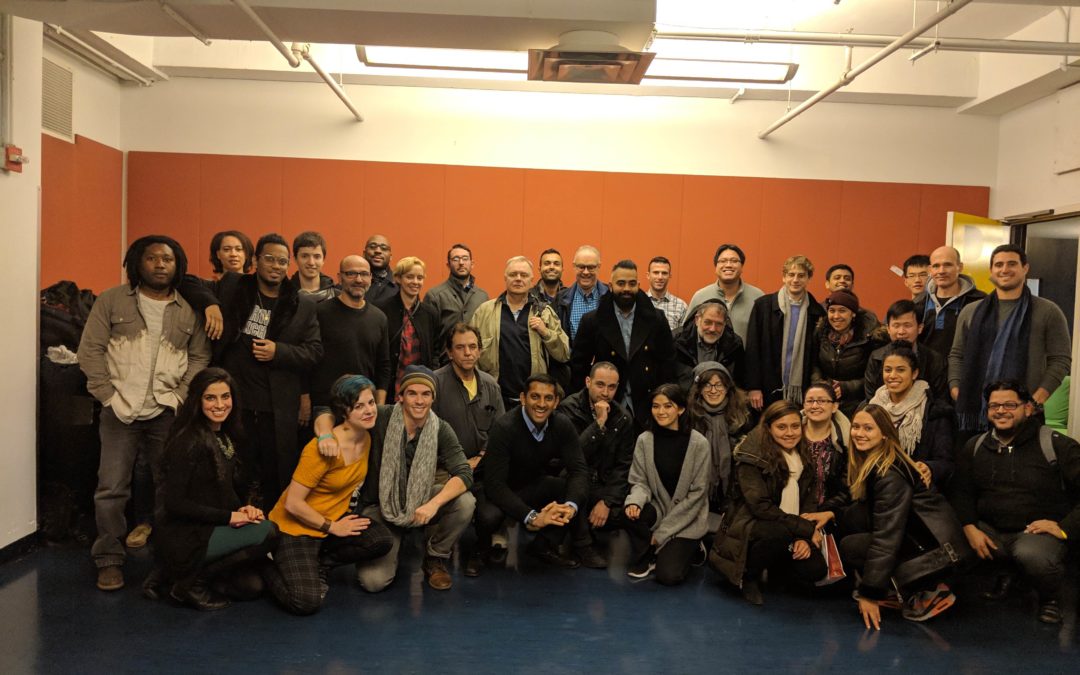
by Chaya Goldstein | Dec 17, 2018 | Recaps
We had an exceptional month at our chapter with two very well attended and diverse meetings. The first meeting was on the third Monday of the month and attended by 35 people, including 2 first timers and 4 SLP’s. The second meeting was held on the last Wednesday of November and was a collaboration between 8 dedicated SLP (Speech- Language Pathologist) and 10 people who stutter. The conversations during the meetings were varied and stimulating. Topics ranged from stuttering and identity, to stuttering and language, to stuttering trauma and healing, and of course, lots of learning and sharing. Here are some of the highlights of the nights:
Stuttering Across Different Languages
We started the night off discussing stuttering across different languages. One member had recently taken a trip to Mexico City and shared how on top of the language barrier, there was a sort of stuttering barrier. Whether it is a lack of confidence in the language, new sounds, cultural defensiveness, or perfectionism, we all agreed that learning a foreign language or communicating with someone speaking a foreign language could cause stress and anxiety, which can enhance stuttering. We then continued the conversation of stuttering, stress, and anxiety to our everyday lives. As great and motivational as these support groups can be, the reality is we are all stuttering every day in worlds that feel so fluent. So, we devoted some good, therapeutic energy to exploring these emotions and justifying our experiences. Stuttering can be extremely overwhelming and taxing on the soul, but we hope that groups like this can inspire feelings of connectedness and validation.
Feelings Surrounding Stuttering and Identity
A question came up of whether it was possible to reach a point where no negative emotions would be felt when identifying themselves as a person who stutters, either to a listener or oneself. One of the members expressed that for him there are and there will continue to be many emotions and thoughts that he feels when identifying as a person who stutters. Stuttering has led him to feel much pain in his life, and it continues to do so at times. But it has also brought him the ability to connect with others in a way he may not have been able to if it were not for his stuttering. It has also helped him become an effective communicator by examining speaking in a different light. And stuttering has brought him to this wonderful community of others who can connect with him in a way that most others cannot.
Relationship Between Stuttering and Trauma
What role does traumatic stuttering experiences from the past play into our present day life? This question surfaced after someone reflected how he found himself perplexed by the intensity of his fears surrounding stuttering in his present day life, despite his high levels of choice and stability. This question led to a heated conversation about the mismatch between the perceived danger surrounding moments of stuttering and the reality of that moment. Many people opened their hearts to share about times they were confused or surprised by the intense response they had to a stuttering moment, and how to this day they can’t wrap their heads around it. The conversation morphed into the latest research on trauma and the brain, including healing modalities for traumatic experiences such as mindfulness, yoga and meditation. The larger question about the connection between stuttering and trauma remained at the end of the night, and several eager participants talked about their interest to explore the topic more outside of the room.
SLP Collaborative Meeting
Our third year in a row SLP collaborative meeting was a huge success. Led by the SLP Liaisons’ Chani Markel and Chaya Goldstein, the night forged a deeper connection between people who stutter and SLP’s. Authentic questions from SLP’s and people who stutter were addressed, including the most effective ways to support people who stutter. People who stuttered got to share their experiences of therapy and the ways they felt SLP’s could support people who stutter in and out of therapy. It was a night of mutual growth, understanding, and support, one we look forward to replicating in the future.
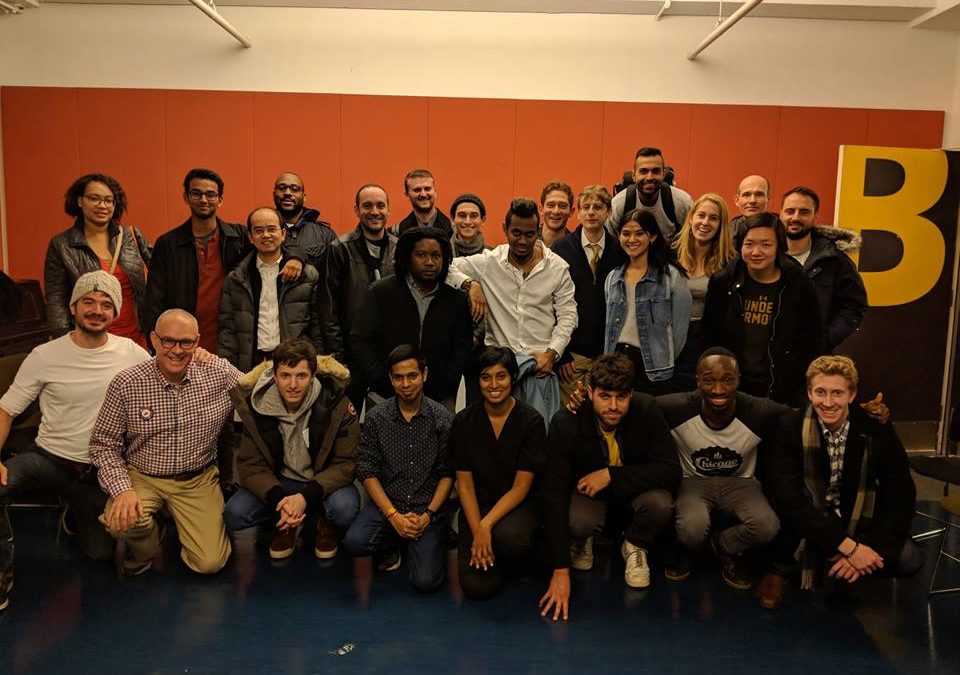
by NSA Manhattan | Oct 31, 2018 | Recaps
On Monday, October 22, about 30+ of us gathered in a room for our Manhattan October meeting. Feeling high from our local NYC Stutters one-day conference just the day before, we had meaningful conversations and connections, and explored some more what it means to be people who stutter. As per meeting tradition, we went to a bar after and decompressed with a drink or two.
One topic that came up in the groups was disability and whether and in what sense stuttering is a disability. We discussed how the definition of disability depends upon whether we are thinking about it from a medical, legal, or personal perspective. We also explored how their own reasons and motivations for considering stuttering to be a disability or not a disability might be similar to or different from the reasons and motivations that non-stutterers might have for thinking that it is or is not a disability.
No matter the relationship, talking about stuttering with parents can be delicate. In one of the groups, we talked about balancing the feeling of not wanting to disappoint your parents with the feeling of not wanting to disappoint yourself and your stutter. In another group, we opened up about how parents do not necessarily understand stuttering sometimes, and as a result can have unrealistic demands of our fluency and need for self-help. As much as parents want to help and protect us, our stuttering journeys are inevitable and unavoidable.
One topic that overlapped all groups was the uniqueness of each of our stuttering journeys. We are all in such different places in our stuttering journeys, and it is always significant to be reminded of it. We have members who stutter proudly, and others who use language that judges stuttering harshly, i.e. “he was stuttering so badly.” We have members who have been covert for most of their lives but just recently have allowed themselves to stutter openly, and in doing so have unlocked the many beauties of life. Some of our members are at a place where they have been fluent for a while, and for some, this ‘fluency’ has come at a cost. These groups where we can process our (sometimes absurd) beliefs, is a critical space, which can allow us to grow. Nevertheless, at times this can be a painful process.
We want to thank everyone for coming and sharing. We are committed to enriching our already abundant community, and we love you all deeply. Until next month!
Announcements:
SLP student Informational Group: Wednesday, November 28th @ 7:30-9pm
We are hosting an NSA meeting for SLP’s and SLP graduate students to learn from our community. We’ve been hosting these meetings once a year for a few years now and they are always a huge success for both SLP’s and the members of our community. This meeting will be at our regular Manhattan meeting space. Stay tunes for more details!
Brooklyn Meeting: The next Brooklyn chapter meeting will be Monday, November 12th. Check out their site here for all info.
Next Manhattan Meeting: The next Manhattan chapter meeting will be back on our regular 3rd Monday on Monday, November 19th at 520 8th Avenue, 3rd floor. We’ll be sure to send out a meeting reminder the week before.
Getting involved: We’re always looking for new ways to continue to strengthen our growing stuttering community. Shoot us an email: manhattanstutters@gmail.com with any ideas!
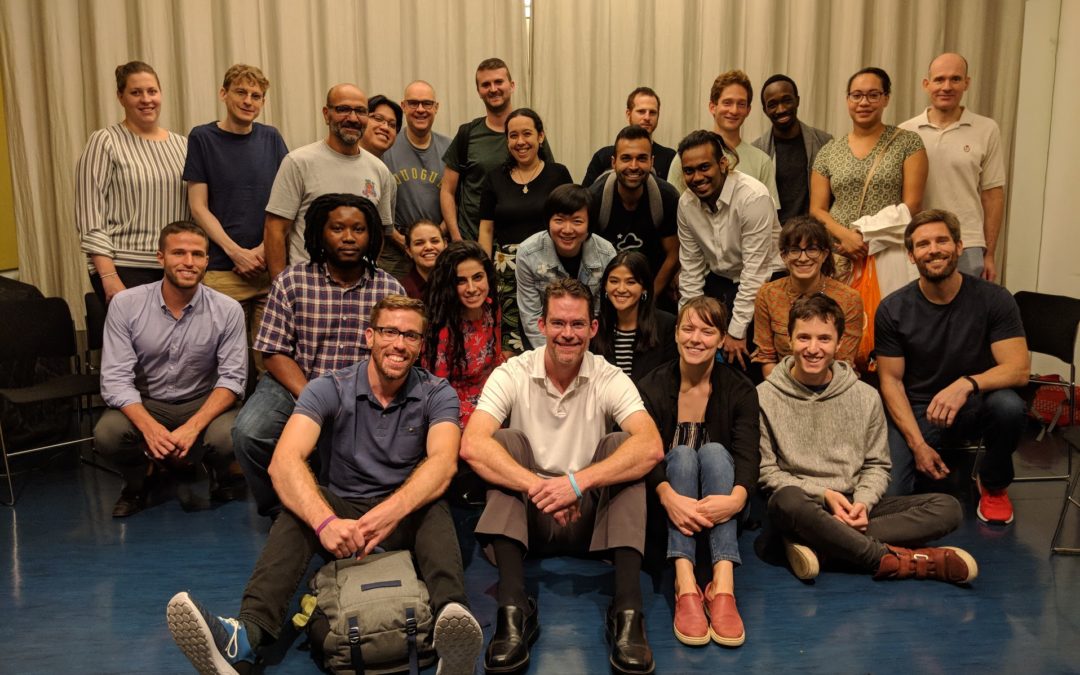
by NSA Manhattan | Oct 8, 2018 | Recaps
On Wednesday, September 26, around 25 of us, people who stutter, met for our long awaited September meeting. During the meeting, we shared parts of ourselves and connected with one another. And after the meeting, we went over to a near-by bar and decompressed with casual conversations, catching up over a drink or two. For those of you who couldn’t make it and for those of you who were there, but just need a little reminder, below are some of the topics we discussed in groups.
In one of our groups, we discussed the different ways people view their stuttering. Is it a disability? Is it not? We noted the “perks” society gave to some who were officially disabled and the struggles they endured when in no man’s land, not identifying with a disability but still experiencing stuttering in a world that has a hard time making space for the grey. Within the same group, someone shared how he had a negative experience recently when he was judged at a party to be drunk and high (when he was neither) because of his stutter. This hit him hard and affected him negatively. It led to a great conversation around how we handle crushing moments. Identifying our locus of control and making choices from that point was the resounding way to get out of a negative spot and move forward.
In another group, the conversation started out a discussion on anxiety. Many shared their thoughts and conversation moved a bit faster than usual. The focus on the conversation was how we felt within the meeting – while speaking, while not speaking, and when we anticipated to speak. Several members felt different levels of anxiety, but for different reasons. One member talked about the adrenaline of being around so many other people who stuttered. Several members talked about where they physically felt the anxiety. One member talked about her though process while anticipation to speak in a group, as a person who stutters, something we can all relate to. It was powerful to talk about our feelings, collectively as a group, and explore these feelings with each other.
In our last group, we jumped around from a few topics – stuttering during a new job, speech therapy, and raising a family. One member began the conversation by sharing that she recently started a new job. With all that she’s been through in her previous jobs with her stutter, it was a sigh of relief to start something new, feeling supported by the resilience she’s gained and this newly found community. Although feeling anxious at unknown, she shared her new outlook on stuttering in the workplace and was determined to feel comfortable and allow stuttering in. Another member shared how she was interested in speech therapy and we went around the room and shared therapy that worked for us, and therapy that didn’t. We all agreed that speech therapy was a form of support, and we owe it to ourselves to seek it if needed.
We are grateful for everyone who showed up, was vulnerable, and shared, and we hope to see everyone again during our October meeting on Monday, October 15.






